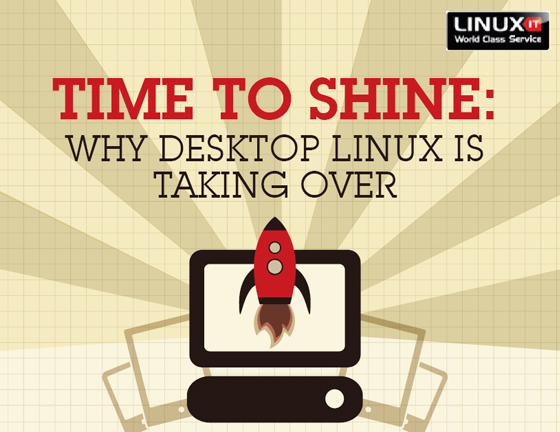Time to Shine: Why Desktop Linux is Taking Over
Microsoft Windows has long been the operating system of choice for corporate level desktop PCs, but times change. There are a number of drivers that are pushing Linux into the domain of the end user device from the enterprise server space; such as tablets, smartphones and the 20 million desktop PCs and countless server installations using the free Ubuntu Linux operating system.
View the Infographic Time to Shine: Why Desktop Linux is taking Over

The key drivers include the fact that support for Windows XP ends in 2014, which raises the question of whether you upgrade to Windows 7 and swallow the huge costs of migration or stick with yesterday’s technology only to watch your competitiveness drain away? Gartner, the research analyst and consultancy firm, says that, within a 10,000 PC estate, the cost of migrating to Windows 7 would cost as much as £1.5m. When times are tough, an Open Source alternative like Ubuntu offers, on the face of it, a cheaper alternative.
There are a number of other factors at play. Mike Curtis, Executive Director – Service Delivery at Linux consulting expert LinuxIT, reveals the following drivers are also changing the way Linux is being used by corporations:
- Hardware maintenance up for renewal.
- Vendor lock-in, requiring you to wait for the vendor to fix any problems without a clue about how it’s going to be repaired. You also buy into an unknown cost of ownership so, if this increases, budgets go out of control.
- UNIX is in decline as organisations are now looking to solutions like Cloud computing, so operating systems have to keep up with the pace of change.
- Linux offers flexibility to deal with changing market conditions.
Some of the benefits of using Linux and other desktop Linux Open Source versions like Ubuntu on the desktop PC include:
- Like all Linux distributions, Ubuntu is cost effective because it’s Open Source.
- Ubuntu comes with five years of guaranteed support – including security and maintenance updates.
- There is a regular, predictable release cycle of Ubuntu every six months and there is also a long-term support version as it’s ready to deploy.
- Ubuntu offers all the applications you’ll ever need to use.
- Ubuntu offers access to a supportive user community.
This goes to show that Microsoft’s operating systems and Office aren’t the only kinds of software that can reside on PCs. Much is changing due to the advent of the application store, too. The dynamics of the market are constantly altering with the growth of mobile technologies and Cloud computing.
Linux has a role to play, and the LinuxIT experts can help you to migrate from a proprietary platform to one that uses Open Source technology.
